 Petzlover
Petzlover Komondor is originated from Hungary but Portuguese Podengo is originated from Portugal. Komondor may grow 46 cm / 19 inches higher than Portuguese Podengo. Komondor may weigh 54 kg / 120 pounds more than Portuguese Podengo. Both Komondor and Portuguese Podengo has almost same life span. Both Komondor and Portuguese Podengo has almost same litter size. Komondor requires High Maintenance. But Portuguese Podengo requires Low Maintenance
Komondor is originated from Hungary but Portuguese Podengo is originated from Portugal. Komondor may grow 46 cm / 19 inches higher than Portuguese Podengo. Komondor may weigh 54 kg / 120 pounds more than Portuguese Podengo. Both Komondor and Portuguese Podengo has almost same life span. Both Komondor and Portuguese Podengo has almost same litter size. Komondor requires High Maintenance. But Portuguese Podengo requires Low Maintenance
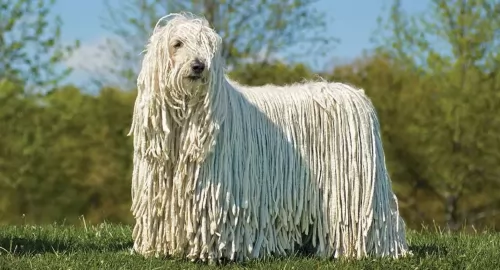 Looking like a giant mop, and sometimes being referred to as 'mop dogs' the Komondor, known also as the Hungarian sheepdog, hails from Hungary.
Looking like a giant mop, and sometimes being referred to as 'mop dogs' the Komondor, known also as the Hungarian sheepdog, hails from Hungary.
The dog was brought to Europe centuries ago so he is a well established breed. It has been declared as one of the country's national treasures.
He is a dog related to many other dogs such as the Pulim the Ovcharka, the Bearded Collie, Old English Sheepdog and others.
 The Portuguese Podengo is an ancient hound dog from Portugal. It is available as a small dog, medium and large dog.
The Portuguese Podengo is an ancient hound dog from Portugal. It is available as a small dog, medium and large dog.
The coats can be short and smooth or longer and wiry. They were imported into the United States in the 1990's and they are also recognized by the Federation Cynologique Internationale in Europe. They are also recognized by the United Kennel Club. In America they are part of the Rare Breed Association.
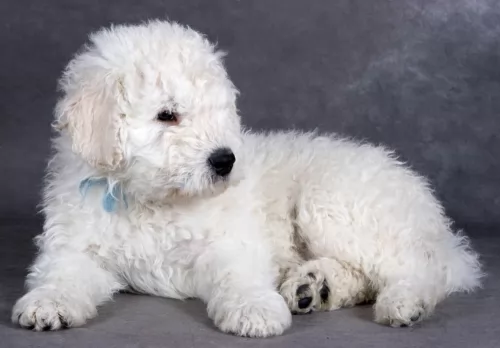 Known for his unique long corded, singular white coat, the Komondor, a molosser dog, is large. Females start at 64cm in height and both males and females can reach up to 76cm in height.
Known for his unique long corded, singular white coat, the Komondor, a molosser dog, is large. Females start at 64cm in height and both males and females can reach up to 76cm in height.
This unusual coat of theirs is wavy and actually forms cords or dreadlocks as the dog matures. You can't easily see the dog's face because of all the hair.You also can't see the tail easily, in fact you might think he hasn't got a tail as it is obscured by the hair. The tail is medium length and held low.
He has a large head, dark brown eyes, and floppy ears. The coat is certainly going to require grooming even though the dog doesn't shed much. His body is robust and well muscled with the body being slightly longer than the height of the dog.
The Komondor has been a dog used for guarding livestock, and while his character is calm and balanced, when the livestock is threatened, he can show another side – more aggressive – as he defends his flock. He makes an excellent watchdog.
He is an affectionate dog with his human family, being a gentle playmate of children. He is slightly reserved and wary of strangers, and is willing to guard and protect his human family from them.
He is also good with other family pets. When you look at him you might think of him as not being very energetic, but he is an athletic dog, fast and powerful. Because of his size and speed, it is best to have him trained and socialized as he can be obstinate. Training him makes him obedient.
 The Portuguese Podengo is available in three sizes. He stands roughly at between 20 to 30 cm and weighs between 4.1 to 5.9 kg. The dog is similar in looks to other hunting dogs native to the Mediterranean, such as the Pharoah Hound.
The Portuguese Podengo is available in three sizes. He stands roughly at between 20 to 30 cm and weighs between 4.1 to 5.9 kg. The dog is similar in looks to other hunting dogs native to the Mediterranean, such as the Pharoah Hound.
They are small to medium sized dogs. The eyes are brown, the ears are erect and the tail long and thick, held low and with a bit of a curve when at rest.
The body of the dog is lean and well muscled and the head wedge shaped. The coat is essentially short and smooth though you also get the longer, wiry coat. The coat is found in shades of fawn or yellow and with some white markings.
This Portuguese sighthound is energetic, comical sometimes, sweet and loving. Being alert, he also makes a good watchdog.
He is intelligent, he is easily trained and socialized and gets on well with children in the house if they have been disciplined to respect and be kind to animals.
He is somewhat aloof around strangers and this is actually what makes him a good watchdog.
It is said that the Portuguese Podengo isn't bred to be a companion dog, being bred exclusively as a working hunting dog. This explains why it doesn’t have such a ‘companionable’ temperament as some other dog breeds.
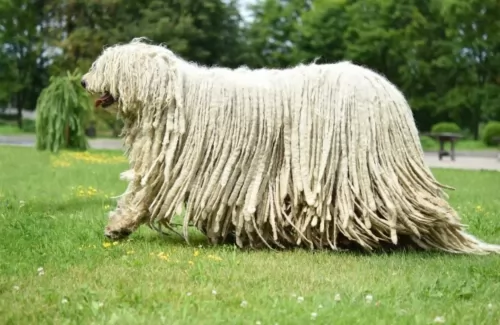 The Komondor is known for his strong guardian characteristics, especially with his human family. He is loving and loyal towards them while being wary of strangers.
The Komondor is known for his strong guardian characteristics, especially with his human family. He is loving and loyal towards them while being wary of strangers.
True, his coat can make people think twice before making this dog a pet, but if you're game and ready to attend to his coat, he can make an excellent family pet. They're fine with other pets too, and he is also an intelligent dog, capable of being easily trained.
He needs a good deal of exercise and can become noisy and destructive without the right amount of stimulation. If you do your part with the Komondor and provide him with a loving, caring home, he will be an awesome pet and guard you with his life.
 The Portuguese Podengo loves pleasing his human owners – loving to be in the company of his human family.
The Portuguese Podengo loves pleasing his human owners – loving to be in the company of his human family.
He is an independent dog who will benefit from training and socialization. He is wary around strangers, but this makes him a good watchdog.
He loves lots of exercise and will want mental and physical stimulation to be happy and content and as bright as he is.
Provide him with good care and he promises to make you a wonderful pet and companion.
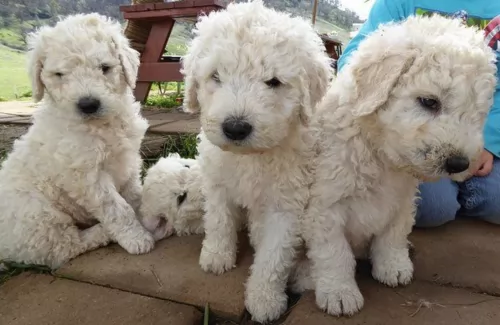 The Komondor is a healthy dog breed who can live to be 10, 11 or 12 years if you look after him well. There aren't any known genetic disorders prominent with the dog, but it pays to know about some of those that could strike -
The Komondor is a healthy dog breed who can live to be 10, 11 or 12 years if you look after him well. There aren't any known genetic disorders prominent with the dog, but it pays to know about some of those that could strike -
This is an irritating eye problem where the eyelash rubs up against the eyes.The result can be scratching of the cornea and eye infections. It is an eye problem which can be corrected with surgery.
Hip dysplasia is a serious genetically inherited disorder and common in large dog breeds. It is caused by a malformation of the hip joint. It can cause problems for the dog, weakening the hip and making it incapable of supporting the weight of the dog.
It also leads to pain for the dog, difficulty with moving and even total lameness. Weight, size of dog, age and genetics are all factors which can increase the dog's likelihood of developing hip dysplasia.
Whimpering, lethargy and refusing to put weight on the leg are common signs of hip dysplasia and your vet will go ahead with ways to relieve the pain and symptoms of your Komondor.
 The Portuguese Podengo is a robust, healthy dog that can get to 14 years of age if he is looked after well and exercised.
The Portuguese Podengo is a robust, healthy dog that can get to 14 years of age if he is looked after well and exercised.
The dog doesn’t battle with genetic disorders. It is thought that the most common problems with this dog are the injuries he gets from being such an outdoor, hunting dog. He could well rip his nail or have porcupine quills in his muzzle.
Some common dog diseases to be aware of are cancer, bloat,skin diseases and eye problems.
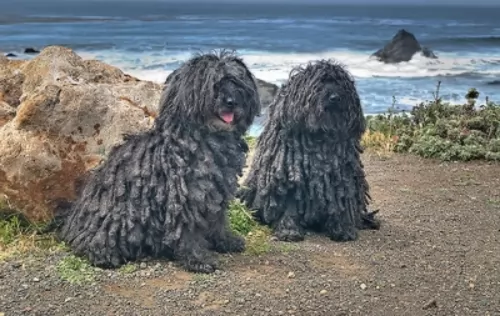 The Komondor is most certainly not a low maintenance dog with that extraordinary coat.Before the dog turns 1, the coat begins to form its cords. These cords can become discolored and matted, In fact the cords will need to be separated to keep the dog clean and free of matted hair.
The Komondor is most certainly not a low maintenance dog with that extraordinary coat.Before the dog turns 1, the coat begins to form its cords. These cords can become discolored and matted, In fact the cords will need to be separated to keep the dog clean and free of matted hair.
For those who keep the dog as a pet and who don't want him to be a show dog, he can be trimmed, otherwise the coat and its maintenance could turn out to be a real issue.
Of course once the distinctive coat has been sheared, he loses that typical and recognizable Komondor look.
Check his ears on a regular basis for wax- and dirt buildup so as to prevent ear infection.
Teeth need to be checked regularly to prevent tartar buildup and if you don't have the time or the knowledge to keep his teeth clean and maintained, take him to the vet as the teeth-treatments they do there will promote healthy teeth and gums.
 The Podengo is always game and ready for a good time and likes nothing more than a good walk as well as the chance to get off his leash and have a bit of free time. He also loves ball games, being pulled along while he holds tightly on to a piece of rope and he loves darting back and forwards with a frisbee.
The Podengo is always game and ready for a good time and likes nothing more than a good walk as well as the chance to get off his leash and have a bit of free time. He also loves ball games, being pulled along while he holds tightly on to a piece of rope and he loves darting back and forwards with a frisbee.
Many things can change a dog’s longevity, and diet is one. A good nutritious diet with vitamins and minerals will give your dog less of a chance to get sick. If you go for the best quality commercially manufactured dog foods, you’ll find they are both convenient and well balanced.
To provide your dog with just a bit of variety in his diet, some home-made food added into the dry kibble from time to time will delight your pet.
No need to make preparing the food a huge issue either. Boil brown rice and chicken in a pot and add in sweet potatoes, carrots and spinach. Chop all this up and as a treat, add smaller portions of it into the dry kibble. This is a real treat for your dog. You’ll see his thanks in his bright eyes and wagging tail.
Try to include a bit of raw meat occasionally and never let your dog be without a constant source of fresh, cool water.
Make sure his puppy vaccines are up to date.
Have your dog spayed or neutered if you don’t want your dog being a parent.
Provide your dog with a warm, dry, comfy pace to sleep.
Trim his nails and check inside his ears for redness and infection.
Check for fleas and ticks when you brush him.
Get him to the vet when you can see he s sick.